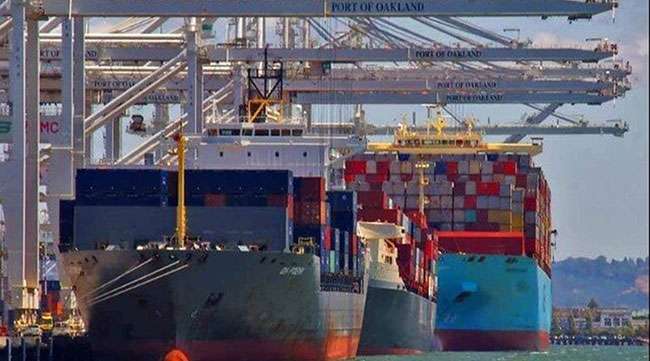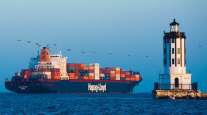Senior Reporter
Port of Oakland Unveils Plan to Encourage Agriculture Exports, Ramp Up Business

[Stay on top of transportation news: Get TTNews in your inbox.]
Facing a loss of business to larger container ports in Southern California, the Port of Oakland will permanently expand its agriculture export business beginning March 1.
For at least one year, until a larger site is developed, a 25-acre, off-terminal, paved container yard will operate to move full containers off truck chassis and then ready agriculture products for pick up to another location or shipment overseas.
Port officials made the announcement Jan. 4.
The Maritime Executive writes - "With Government Support, Port of Oakland Works to Improve Ag Exports" https://t.co/2xmj23QAg7 #ports #maritime #logistics #supplychain #trade #agexporters #exporters #containeryard — Port of Oakland (@PortofOakland) January 4, 2022
“Agricultural exports have always been a vital part of Oakland’s success, and they’ve been struggling over this last year,” Oakland Maritime Director Bryan Brandes told Transport Topics. “One of the areas where we are focusing on is having the facilities near docks so that the agricultural exporters can bring their product in, transload it into ocean containers straight across the street for a quick export out.”

Brandes
Because of the explosive growth of international trade, transloading, in which products and commodities are transferred immediately from one mode of transportation to another en route to the ultimate destination, has become the standard method for shipping goods in recent years.
Brandes said the new yard would provide access to equipment and other services to provide faster truck turns without waiting for in-terminal space. Federal and state agricultural agencies will assist exporters to encourage use of the site.
By mid-2023, the yard will be expanded as port officials plan to have a location ready that is at least five times larger specifically to handle agriculture exports. The temporary facility will cost $2 million to prepare.

Porcari
Late last year, officials from the port, California officials, White House Port Envoy John Porcari, and other key stakeholders met to discuss Oakland’s declining market share for export containers. But 400 miles to the south, dozens of cargo ships sat docked in San Pedro Bay for weeks, waiting for slots at the ports of Los Angeles and Long Beach, and month-over-month container volumes at those facilities reached record levels.
But at Oakland, business was in a steep decline.
Last spring and summer, international shippers had determined that because of the extraordinarily high cost of shipping and the record profits they were making, it made better business sense to bypass the usual stop in Oakland. Instead, cargo ships headed back to Asia, in some cases nearly empty, and then immediately picked up another cargo load and headed back to Southern California.
Hard Times
Port of Oakland endured a difficult October compared with October 2020 levels.
• Containerized import volume: Down 14%
• Exports: Down 27%
• Ship calls: Down 43%
Source: Port of Oakland
Brandes said that by not stopping at Oakland for several months, the port’s multibillion-dollar agriculture export business was in jeopardy, leaving farmer-specific shippers scrambling to find other, often more expensive ways to move their products overseas.
At the peak of the shipping crisis, one of the region’s leading agriculture figures put it this way.
“We’re at the mercy of foreign shipping companies,” Western Agricultural Processors Association CEO Roger Isom said in November. “We’re in a game, somebody changed the rules on us, and we have no way to correct it.”

Isom
According to the California Department of Food and Agriculture, the state’s farmers in 2019 exported more than $8.1 billion in almonds, walnuts and pistachios, mostly to overseas consumers. Because of its proximity by truck to Northern California’s extensive agriculture basin, the Port of Oakland plays a crucial role in moving those products, plus fruits, vegetables and wine.
“The port — along with our federal and state partners — is ready to do everything we can to help provide room and relief to help our agricultural customers,” port Executive Director Danny Wan said.
Oakland also has a relatively new intermodal yard and rail connection, linking the facility to Midwest farmers who annually process millions of tons of refrigerated beef, pork and poultry to ship to people in the expanding economies in Asia. Poultry giant Tyson Foods and JBS USA, the parent company of Swift Meats, are two of Oakland’s biggest protein exporters.
Port leadership said it has learned a valuable lesson this past year about ways to stay competitive, maintain and grow its market share. The new facility is proof it’s able to do that quickly and efficiently.
We’re never going to have the size and volume of Los Angeles and Long Beach; we just don’t have the real estate to do that,” Brandes said. “We want our exporters to know that Oakland is their port of choice. This is an opportunity for Oakland to be a niche port for our exporters as well as for our regional exporters.”
Want more news? Listen to today's daily briefing below or go here for more info:




